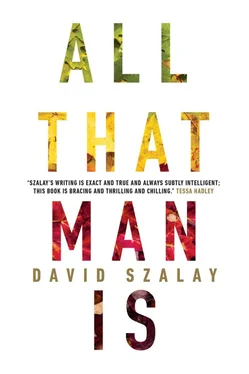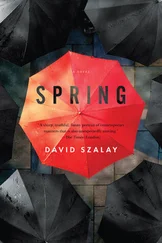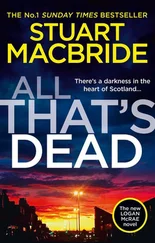‘That’s it,’ Hans-Pieter says.
He starts on his second bread roll.
For some time Murray says nothing.
The little trees in the street outside shake and sway.
At the shadow-draped bar, Ester is talking to someone on her phone, laughing.
And I was at Beckie’s place, Murray thinks, trying to sleep. The Spider-Man duvet. And they were. At that same moment. Last Friday.
He is staring at Hans-Pieter with an expression of shocked loathing. ‘What the fuck does she see in you?’ he says.
—
What does she see in Hans-Pieter? The question keeps Murray awake that night. He sits there, in the tall mausoleum-like spaces of his flat, smoking in the darkness. What seems obvious to him is that if he had only made his own intentions plainer, sooner, he and not Hans-Pieter would have her. That thought torments him for a while. Not that he even particularly wants to have her in any physical sense. There was something limply sentimental, something vague, something almost like pity, about his feelings for Maria. And what she sees in Hans-Pieter is obvious enough — Hans-Pieter is just a lesser version of himself, a poor woman’s Murray. A foreigner from somewhere further west, with at least some money. Hans-Pieter even has a car — an old rust-perforated 1.2 litre Volkswagen Polo, leaking oil in a side street. In the context of the Umorni Putnik, that makes him a more or less plausible sugar daddy.
He’s welcome to her, Murray decides.
He’s welcome to the fat tart.
And the good thing is, this will give him more time to focus on his business interests. Which is what he should be doing anyway, not messing about with floozies. His business interests. Airport transfers. Minibus to Zagreb airport. Blago has the drivers lined up. He has the advertising lined up. The website is ready to go. He just needs the minibuses. He has enough for one, he says, but he needs four to make the business viable. So he offered Murray the opportunity to invest. They talked about it in Džoker, and then over lunch. Put in the money for the minibuses, get a fifty per cent stake, was Blago’s proposal. And sitting in an HSBC in Kingston upon Thames last Wednesday, Murray had finalised the loan, against the house in Cheam, and transferred the money to the account of Slavonski Zračne Luke d.o.o., the details of which — IBAN number and so forth — Blago had provided for him. Blago has shown him the minibuses he intends to buy — ex-police vehicles he found online, for sale in Osijek. Said he’d be going down there to get them just as soon as the money arrives. Murray said he wanted to come with him, to see the vehicles for himself. ‘I know a thing or two about that,’ he had told Blago. He had insisted on having a veto, if he didn’t think they were up to scratch.
He has tried Blago’s phone once or twice since he got back from the UK, to find out if the money has arrived.
No answer. That was typical Blago.
—
The most pressing issue, he finds, is the Hans-Pieter-shaped hole in his own days, which he now mostly drifts through alone. They used to meet every morning in the Umorni Putnik. These days, most of the time, Hans-Pieter isn’t there. Murray drinks his cappuccino, while pretending to look at the paper. He stays there for more than an hour, sometimes.
Occasionally Hans-Pieter does show up. One morning, when he does, Murrays says to him, ‘What you up to later then?’ Which is what he always used to say — and the answer would always be words to the effect of ‘not much’, and they would agree to meet at Džoker ‘later’, meaning some time fairly soon after lunch.
Today, however, Hans-Pieter just shrugs.
When Murray suggests a drink in Džoker ‘later’, Hans-Pieter is initially evasive, and then says something about a film he’s planning to see.
‘Oh?’ Murray says. ‘What you seeing?’
Iron Man 3 , Hans-Pieter tells him.
There is a silence. Then Murray says, ‘Mind if I come along?’
Another silence. Hans-Pieter says, not particularly warmly, ‘If you want.’
‘If it’s okay with you,’ Murray says.
Hans-Pieter looks down at his Adidas trainers. ‘It’s okay.’
‘Where shou’ we meet then?’ Murray asks.
‘Here?’ Hans-Pieter suggests, without enthusiasm.
So they meet there, in the middle of the afternoon, Hans-Pieter and Maria arriving together.
Maria does not seem pleased to see him — to see Murray, waiting there in his slacks. He tries to be friendly. She isn’t having it. She hardly says a word on the bus out to the edge of town, where there is a tatty shopping mall with a few screens embedded in it.
It is then, strap-hanging, that Murray starts to wonder whether this was really such a good idea. The others seem to be deliberately not looking at him. When his and Maria’s eyes meet, he tries to smile at her. She looks away immediately and he asks her about the film. ‘So what we going to see then?’ he says. ‘Is it any good?’ She pretends not to hear him.
Most of the other people in the ticket queue are kids — lads with faceted glass earrings and sagging waistbands and shrieking ladesses in tiny skirts or tracksuits, slurping sugary drinks and throwing popcorn at each other. Among these high-spirited youngsters, with Hans-Pieter and Maria sometimes snogging next to him, Murray sits for two hours, watching the noisy action film. It is dubbed in Croatian and he understands fuck-all.
Afterwards, while Maria is in the ladies, Hans-Pieter tells him they’re going back to her place, and asks Murray what he’s going to do.
‘I dunno,’ Murray says, just standing there in the foyer.
There is a short silence and Murray has the appalling feeling that Hans-Pieter is pitying him — that fucking Hans-Pieter is feeling sorry for him .
Well, fuck that.
‘Don’t you worry,’ he says. ‘I’ve got things to do. You give her one from me, okay?’ And with an unpleasant smile, he nods towards Maria, who is approaching them.
—
He spends the next few hours in Džoker, drinking Pan lager and thinking, If the likes of Hans-Pieter can sort himself out with a woman, then I sure as fuck can.
Matteus nods.
Without meaning to, Murray had said it aloud. Matteus, tall and austere, possessor of a monastic vibe, is taking glasses out of the dishwasher and putting them on a shelf under the bar.
It is not even eight o’clock, and Murray is already quite drunk.
In Oaza later, he happens on Damjan.
They are sitting at a table together in the kebab shop and Murray is saying, ‘If the likes of Hans-Pieter can sort himself out with a woman, then I sure as fuck can.’ Inelegantly, he is eating a kebab.
Damjan says, ‘Sure.’ He and his friend have already finished, were about to leave when Murray arrived. They talk in Croatian, the two of them — a muttered wry exchange of words. Murray, shoving the last wet mess of the kebab into his mouth, wonders what they are talking about.
‘What you gonna do now?’ he asks, wiping his lips with a paper napkin.
Damjan’s friend, it turns out, speaks perfect English. He sounds like an American.
‘We’re gonna go party,’ he says, grinning. ‘You wanna come?’
‘Fuck, yeah,’ Murray says. ‘Good man. Let’s go.’
As they leave, one of the twins says something to Damjan.
The kebab shop is owned by Albanian twins, identical, of vaguely thuggish appearance. Shaved, spherical heads. Fleshy noses. Strong necks and heavy eyebrows. Murray can never tell them apart. At first he didn’t realise there were two of them; then one day he saw them together. They usually sit out on the terrace in front, under the awning where a water-feature tinkles, puffing at a hookah and drinking tea. Other, more desperate-looking men — often with moustaches — hang out with them there, and any number of women, young and old. A souped-up white Honda Accord EX 2.2 litre diesel is frequently parked in front of the shop, which Murray assumes must be owned by one of them.
Читать дальше












